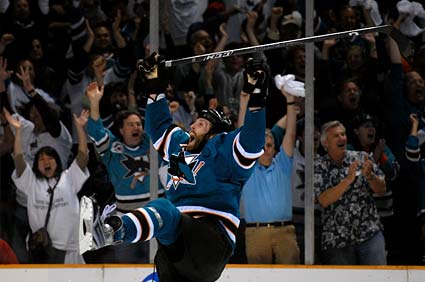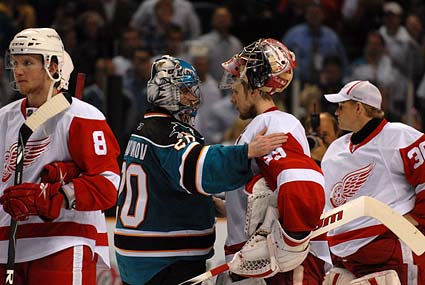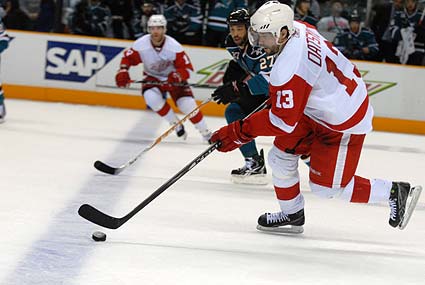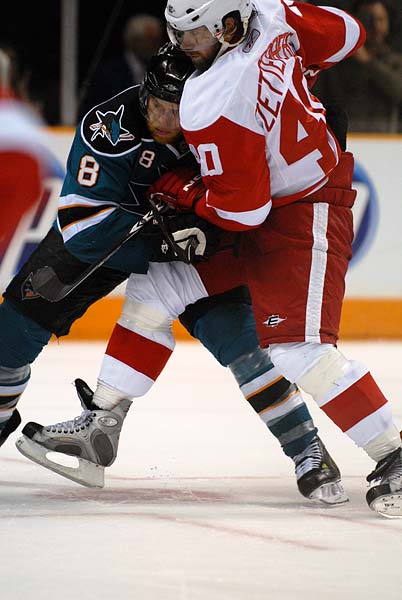WCSF Game 5: San Jose is back in the Western Conference Finals, Marleau and Thornton lead Sharks to 2-1 win with pair of goals

#19 JOE THORNTON CELEBRATES WIN OVER DETROIT, TRIP TO WCF

#20 EVGENI NABOKOV SHAKES HAND OF #35 JIMMY HOWARD AFTER GAME

#13 PAVEL DATSYUK CARRIES THE PUCK INTO THE SHARKS ZONE LATE

#8 PAVELSKI BATTLES FOR A 3RD PERIOD FACEOFF WITH #40 ZETTERBERG
San Jose Sharks head coach Todd McLellan may have sidestepped the question of whether Saturday night’s 2-1 win and WCSF victory over the Detroit Red Wings was a changing of the guard, but one thing is certain. If these two teams meet again, neither will be the same.
For three seasons, the Stanley Cup Finals and Conference Finals in the Western Conference lead through Detroit. The ‘Big Four’ in the West, truely became the ‘Big One’ as the Red Wings played on a level few teams could match in the postseason. That has changed. Gone are key contributors Marian Hossa, Jiri Hudler and Mikael Samuelsson. The Wings became a more top-heavy club, more reliant on Nicklas Lidstrom and Henrik Zetterberg to set the table for Pavel Datsyuk and Henrik Zetterberg.
“It shows the mental toughness of this team, to bounce back after losing a big one,” Joe Thornton told the media after the game. “They have been the best hockey team in the last five years, in my opinion. They’ve dominated this whole League. They’ve gone to conference final after conference final and Stanley Cup appearances. As far as I’m concerned, they’ve been great for the last 20 years, actually.”
It is now the San Jose Sharks who are the more complete team. Stocked with role players and grit, the Sharks now have enough talent to bide their time until Patrick Marleau, Joe Thornton, Dany Heatley or Joe Pavelski can take over a series. For the second time in the last three games, Patrick Marleau and Joe Thornton put their stamp on the Red Wings forehead. Thornton and Marleau connected for the breakaway 2-on-1 goal to end game 3. They reunited on the scoresheet in the series clinching game 5.
After being outshot 15-6 in the first period (29-12 Corsi), Brian Rafalski opened the scoring for Detroit with a point shot early in the second period. On the play, Johan Franzen skated up on Thornton from behind, grabbed his stick, and threw it to the ice. Thornton was not able to get back on defense before the goal was scored.
Joe Thornton would answer 2:14 later on the power play. With Brad Stuart in the box for an elbowing penalty, rookie defenseman Jason Demers took several hard lateral strides at the point to open up a shooting lane. Goaltender Jimmy Howard could not control the point shot, and offered up a low rebound. Dany Heatley was stick checked by Nicklas Lidstrom, but he one armed a pass to Joe Thornton at the side of the net. Thornton tucked it around the prone netminder to tie the game at 1-1.
Former San Jose Sharks defenseman Brad Stuart dropped another people’s elbow on Joe Pavelski later in the period, knocking out a tooth with a hard lead elbow to the face before initiating a check along the boards. Pavelski calmly handed his tooth to a trainer on the bench, and returned to the ice for his shift. He would get a golden opportunity for retaliation early in the third period. Stickhandling around defenseman Niklas Kronwall at the blueline, he turned up ice for a breakaway with one hand on his stick. Kronwall reached out and grabbed him, and the officials awarded Pavelski a penalty shot. “The Big Pavelski” has been the Sharks leading shootout goal scorer, utilizing a patented hesitation/roof shot to seal the deal on 14 of 30 opportunities over the last 3 years.
Saturday night the ‘Pavelski move’ resulted in a shot just high and wide of the top corner. Rookie goaltender Jimmy Howard deserves credit on the play, coming out on top of the crease and cutting down the shooting angle.
The game would be decided by San Jose’s top two players, Joe Thornton and Patrick Marleau. After a solid forecheck by Dany Healtey pressured Brian Rafalski into a turnover, Thornton set up with his back to the end boards looking for Marleau in front. Marleau dropped to one knee, but got enough on the shot to rifle it cleanly past Howard for the game winning goal. It was Marleau’s 40th career playoff goal, 12 of which have been game winners (30%).
“When you look at Jumbo as the playoffs have evolved, I think you see that he has become more and more comfortable playing a role outside of being a pure setup man and scorer,” Todd McLellan said of Thornton. “He has played extremely physical, and he has been real good in the faceoff circle, he has killed penalties. His turnover ration has really gone down. We couldn’t be happier for him. He is one of the individuals I talked about earlier, one of the players that had to shed a reputation whether it was gained fairly or not. Up to this point, he has done a real good job.”
That was evidenced Saturday as Thornton finished with a goal, assist, 3 hits, and a dominating 10-4 performance (71%) from the faceoff circle. Jumbo was in the zone all night, but his largest contribution may have been on a pair of penalty kills with linemate Dany Heatley in the second period. Neither are known for their fluidity on the defensive side of the ice. Instead, they were a churning and passing menace to the Detroit power play. Twice they pinned the Wings deep in their own zone with Joe Pavelski and Dan Boyle in the box. The performance by the Sharks as a whole during the Pavelski penalty may have been the Sharks best penalty kill of the postseason, and with Boyle out Thornton refused to give up the puck or dump it in. Instead of curling into the neutral zone and waiting to make a play, Thornton carried it deep and forced multiple Wings to take it from him.
It was a “little thing” as hockey insiders like to say, similar to winning a faceoff and sealing off Todd Bertuzzi on a forecheck minutes later. The little things added up, and resulted in a critical 2-1 win on home ice.
“It is a fine line, they were up in the series last time we played them in the playoffs. Ron Wilson was the head coach, and they had a turnover in the neutral zone. Robert Lang ended up making a play and scoring. We ended up winning the series, that is how tight it is,” Detroit Red Wings head coach Mike Babcock said about facing this team in the 2007 playoffs. “There is no difference in this series. There are lots of tight games. I think when your players like Thornton, Marleau, Boyle, Heatley and Pavelski go to the Olympics, they grow and they watch what the really good players do, and how competitive they are. Now they bring that back and it makes their team better.”
“The Sharks have been a very good team the past few years and they play smart. Every time you make the playoffs, you learn more and more and eventually you start playing better in the playoffs,” Detroit center Henrik Zetterberg told the media after the game. “They are playing smarter and they are playing more like a team.”
Evgeni Nabokov also rebounded well from Thursday stopping 33 of 34 shots against. Nabokov withstood a Red Wings onslaught in the second period, allowing only 1 goal on 14 shots, and he locked down the crease during a whithering push by Detroit to tie the game late. “I don’t know if this is redemption or not. Playoffs are such an interesting tournament, I will call it that, where you play a good game and have to forget it and move on. You play a bad game, you have to do the same thing, because the next game is the most important thing,” Nabokov said after the series clinching win. “We wanted to finish at home, and we did… The guys battled, they showed their character, and they did a great job.”
A photo gallery from this blog is available here.
[Update] Sharks 2, Wings 1: Detroit finished in five games – Chris McCosky for the Detroit News.
A couple of minutes later, Johan Franzen took a blindside hit to the head by Douglas Murray in the Sharks’ zone. No call was made and with Franzen down, the Sharks went on a two-on-one rush. Howard bailed them out by stopping Dany Heatley in the crease, but the Sharks maintained the puck in the Wings’ zone.
“He sure didn’t come from the front of me,” said Franzen. “He came from the side. It was a late hit, a blindside hit and it was to the head. I thought two months ago the league tried to take that away. Instead, they come down and get a faceoff in our end instead of us getting a five-minute power play.”
Three problems. First, Frazen has been the player who has complained to the referees the most this series, in this instance to Dan O’Halloran and Tim Peel. His credibility with NHL officiating is approaching Dan Carcillo levels. After a legitimate missed call on a Devin Setoguchi high stick in game 2, Frazen complained and berated the referees to a ridiculous level. At some point, players have to acknowledge a blown call as a blown call and move on. Franzen stood and stared at the referees for minutes, and then argued each step of the way to the box.
Second, shortly before the alleged Murray hit on Frazen Justin Abdelkader hammered Pavelski into the boards on a similar hit from the side. If you call that play on Murray, you call a similar penalty on Abdelkader 10 seconds earlier. Also on Douglas Murray’s alleged “blindside” hit, if you drive the zone and then turn the back on the defenseman 5 feet in front of you, 90% of NHL referees are not going to call the play. A CSNCA slo-mo replay showed the Murray check hit Franzen in the shoulder pads, not the head. Franzen remained motionless on the ice, again for minutes, as Marleau and Heatley created a 2-on-1 in the opposite direction. Franzen got up working his jaw, then switched to vigorously complaining to the ref of a hit to the head. No call. The offensive zone faceoff ultimately resulted in the Sharks game winning goal, one of many careless mistakes that cost Detroit this series.
Third, Franzen and Brad Stuart combined for a heavy check later in the period that left Douglas Murray legitimately motionless on the ice for several seconds. If referees miss a call in the game, players have the option for redress of their own. Detroit took that option. Stuart left his feet and exploded with a violent collision into Murray in front of the Detroit boards. There would be a spectacular photo of that hit on this blog, except there was a referee in the middle of the photo (with arms and legs splayed on either side). Murray slowly headed to the bench with a bloody lip and nose, but later told coach Todd McLellan he was ok.
[Update2] End of an era in Hockeytown? Lidstrom’s decision will dictate Wings’ path – Pierre LeBrun for ESPN.
[Update3] “This is a very big win for our organization for a lot of different reasons” — Todd McLellan – David Pollak’s Working the Corners blog.
[Update4] Despite run, Sharks still face tough questions – John Buccigross for ESPN.
[Update5] Red Wings Will Rebuild, Not Overhaul – friend of the blog Lyle Spector for FoxSports.com.







 Editor: Jon Swenson
Editor: Jon Swenson Writer: Max Giese
Writer: Max Giese Writer: Darryl Hunt
Writer: Darryl Hunt
Pingback from WCSF Game 1: San Jose Sharks vs Detroit Red Wings series preview, a changing of the guard? | SHARKSPAGE
Time April 29, 2011 at 6:48 AM
[…] scored a goal, and set up Patrick Marleau for another game winner to close out the Wings in 5 games. After the win current San Jose head coach and former Detroit assistant coach Todd McLellan […]